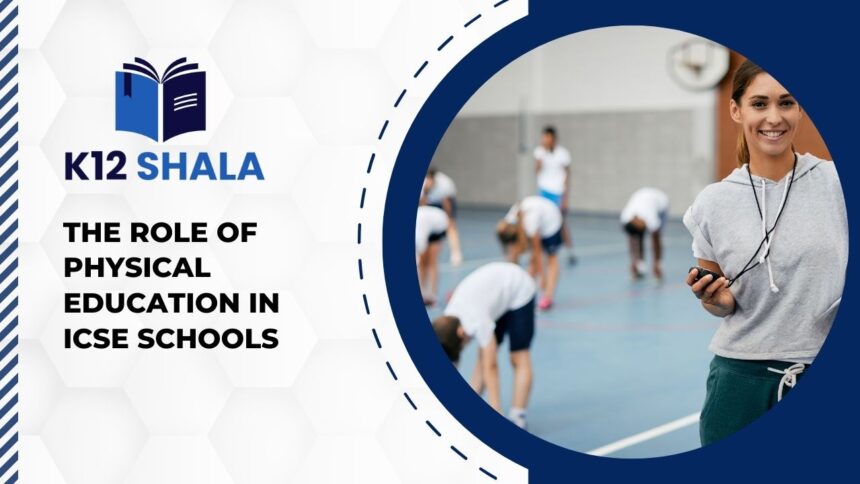Welcome to a world where physical education isn’t just about running laps or playing sports—it’s about shaping well-rounded individuals ready to conquer life’s challenges. In ICSE schools, the role of physical education goes beyond mere exercise; it nurtures skills like teamwork, leadership, and resilience. So buckle up as we dive into the dynamic realm of physical education and its pivotal importance in ICSE schools!
Importance of Physical Education in ICSE Schools
Physical education in ICSE schools is not just about keeping students active; it’s a fundamental component of their holistic development. It plays a crucial role in promoting physical fitness, mental well-being, and overall health. By engaging in various physical activities, students learn essential life skills like discipline, time management, and goal setting. Moreover, PE classes provide a break from traditional academic pursuits, allowing students to recharge and refocus their minds.
Incorporating physical education into the curriculum helps foster a balanced approach to education by emphasizing the importance of both mind and body. It instills values such as sportsmanship, teamwork, and perseverance—all of which are invaluable beyond the school premises. Physical education in ICSE schools sets the foundation for students to lead healthy lifestyles and excel in all facets of life.
Benefits of Physical Education for Students
Physical Education in ICSE schools offers numerous benefits for students beyond just physical fitness. Engaging in sports and activities helps improve overall well-being while instilling important life skills like teamwork, discipline, and resilience.
Regular participation in physical education classes enhances cognitive function and concentration levels, leading to better academic performance. It also promotes healthy habits early on, reducing the risk of obesity and other health issues later in life.
Furthermore, physical education provides a platform for students to discover their strengths and interests outside the classroom. It fosters a sense of camaraderie among peers and teaches valuable lessons about sportsmanship and fair play.
By incorporating physical activity into their daily routine, students can effectively manage stress levels and develop crucial social skills that are essential for personal growth and success in various aspects of life.
Curriculum and Activities in ICSE Schools
When it comes to physical education in ICSE schools, the curriculum and activities play a crucial role in shaping students’ overall development. The curriculum is designed to not only focus on traditional sports but also include modern fitness trends like yoga and aerobics.
Students are encouraged to participate in a variety of activities such as athletics, swimming, martial arts, and team sports like football and basketball. This diverse range of options helps cater to different interests and talents among students.
The emphasis is not just on competition but also on fostering teamwork, leadership skills, and sportsmanship. Through these activities, students learn valuable life lessons that go beyond the classroom walls.
Additionally, incorporating fun yet challenging physical education activities keeps students engaged and motivated to lead an active lifestyle both during school years and beyond graduation.
Challenges and Solutions for Incorporating Physical Education
Incorporating physical education in ICSE schools comes with its set of challenges. Limited class time and academic pressure often push PE to the sidelines. Additionally, budget constraints may restrict access to proper sports equipment and facilities.
One solution is to integrate physical activities into daily routines, like short exercise breaks between classes or incorporating movement into lessons. This way, students stay active without compromising on academics.
Engaging teachers who are passionate about PE can make a significant difference. Providing them with training and resources can help enhance the quality of physical education programs in schools.
Collaboration with local sports clubs or community centers can also offer opportunities for students to participate in a variety of sports beyond what the school alone can provide. Networking with external partners can enrich the overall PE experience for students.
Role of Technology in Enhancing Physical Education
In this digital age, technology plays a crucial role in enhancing physical education curriculum in ICSE schools. The integration of tech tools like fitness trackers, virtual reality simulations, and interactive apps revolutionizes the way students engage with PE classes.
With the help of wearable devices, students can track their physical activity levels accurately and set personalized fitness goals. Virtual reality programs provide immersive experiences that make learning about sports techniques more engaging and interactive.
Interactive apps designed for physical education not only offer instructional videos but also enable students to track their progress, receive instant feedback, and participate in virtual challenges with classmates. This gamified approach motivates students to stay active and competitive while having fun during PE lessons.
By leveraging technology effectively, ICSE schools can create dynamic and innovative ways to teach physical education concepts that cater to different learning styles. From promoting teamwork through online collaborations to encouraging healthy competition through virtual games, technology enriches the overall PE experience for students.
Impact of Physical Education on Overall Development
Physical education plays a crucial role in shaping students’ overall development. It goes beyond just physical fitness; it also fosters mental and emotional well-being. Engaging in sports and activities helps build teamwork, leadership skills, and resilience.
Participating in physical education classes boosts self-esteem and confidence levels among students. It teaches them the importance of goal-setting, discipline, and perseverance. Through various exercises and games, students learn how to manage stress effectively.
Moreover, physical education contributes to enhancing cognitive abilities such as problem-solving skills, memory retention, and concentration. Regular physical activity has been linked to improved academic performance as it stimulates brain function.
Incorporating physical education into the curriculum creates a holistic approach to learning that benefits students both inside and outside the classroom. It instills healthy habits early on that can last a lifetime while promoting a balanced lifestyle for overall growth.
The Importance of Sports and Games in ICSE Schools
Sports and games play a crucial role in ICSE schools, promoting holistic development beyond academics. They provide students with opportunities to hone their physical skills while fostering teamwork and sportsmanship. Engaging in sports activities helps students stay active, leading to improved overall health and well-being.
Participating in sports also teaches valuable life lessons such as resilience, discipline, and time management. It instills a sense of competitiveness balanced with the importance of fair play. Through sports, students learn how to handle wins graciously and overcome setbacks gracefully.
Moreover, involvement in games cultivates leadership qualities among students as they navigate challenges both on the field and off it. Sports serve as a platform for self-discovery where individuals can explore their strengths and weaknesses while learning important values like perseverance and determination.
In ICSE schools, emphasis on sports empowers students to excel not just academically but also athletically, nurturing well-rounded individuals prepared for success in all aspects of life.
Conclusion: The Future of Physical Education in ICSE Schools
As we look ahead to the future of physical education in ICSE schools, it is clear that its significance will only continue to grow. With a greater emphasis on holistic development and well-being, schools are recognizing the pivotal role that physical education plays in shaping students’ lives.
By prioritizing physical activity, incorporating innovative technologies, and fostering a culture of sportsmanship and teamwork, ICSE schools can pave the way for a healthier and more balanced generation. The benefits of physical education go beyond just fitness; they extend to mental health, social skills, and overall academic performance.
It is evident that physical education is not just an extracurricular activity but an integral part of the educational experience. As we embrace this paradigm shift towards comprehensive well-being in schools, we are nurturing individuals who are not only academically proficient but also physically fit and emotionally resilient.
The future of physical education in ICSE schools holds great promise – one where every student has the opportunity to thrive both inside and outside the classroom. Let us continue to champion the importance of physical education as we shape the leaders and citizens of tomorrow.










